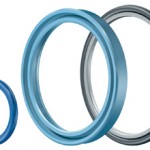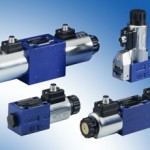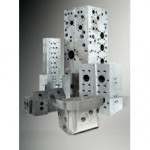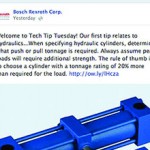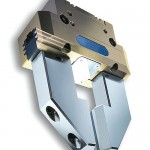By Josh Cosford Seals are the unsung heroes of the fluid power industry; they work hard in nearly every conceivable pump, valve or actuator, providing function, efficiency and reliability far exceeding their cost or complexity. For such a simple invention, the seal exists in countless configurations, often with nearly imperceptible differences, but different all the […]
Engineering Basics
Hydraulic valves on mobile machinery
Hydraulic valves, in addition to the force density advantage of actuators, are what help make hydraulics unique in their control of force, torque and motion. Valves govern direction, pressure and flow of hydraulic fluid, enabling smooth, safe and controlled use of actuators. Every machine both requires and uses valves, varying vastly in execution from a […]
Hydraulic manifolds on mobile machinery
By Josh Cosford A hydraulic manifold is a metal billet of either ductile iron or aluminum, machined for and installed with cartridge valves. It is a form of compact hydraulics enjoyed with many benefits and with few downsides. The most obvious advantages with manifolds (sometimes called combination valves, blocks or integrated circuits), is in their […]
Hydraulic hose on mobile machinery
By Josh Cosford Because it is impossible to physically stack every component of a hydraulic system like a Jenga tower, plumbing is required to direct hydraulic energy through the circuit. Pipe, tube and hose are required to channel fluid through the system, and the requirements of the system must be reflected in the choice of […]
Hydraulic cylinders for mobile machinery
By Josh Cosford Hydraulic cylinders are used in countless machinery applications: Excavators, loaders, balers, telehandlers, cranes, man-lifts, drill-rigs, dump trucks—not to mention operating booms, arms, lifts, platforms, buckets, and platens. Hydraulic cylinders are the most effective and efficient method of pushing, pulling, lifting and lowering. Cylinders convert hydraulic energy into linear pushing or pulling mechanical […]
Hydraulic pumps in mobile machinery
By Josh Cosford There are a lot of components in a hydraulic system that are not required to achieve the result of work, but you wouldn’t get very far without a pump. The hydraulic pump is the heart of any mobile machine, converting mechanical energy to hydraulic energy, and then pumping it out into the […]
Rexroth “Tech Tip Tuesdays”: Connecting Engineers and Followers
Tech Tip Tuesdays is a Rexroth social media initiative for sharing knowledge about mechanical and electrical engineering, wind energy, hydraulics and more. In order to connect Rexroth engineers with fans and followers, the company launched Tech Tip Tuesdays via Facebook and Twitter in June 2013. Each Tuesday, a new technical tip is posted to the […]
Hydraulic Grippers
Grippers are devices used with pick-and-place robotic systems to pick up or place an object on an assembly line, conveyor system, or other automated system. Fingered tooling—or jaws—is attached to the grippers to grip or hold the object. They come in a variety of styles and powered designs. Three common types are parallel, three-finger, and […]
What are Hydraulic Motors?
Hydraulic motors are rotary actuators that convert hydraulic, or fluid energy into mechanical power. They work in tandem with a hydraulic pump, which converts mechanical power into fluid, or hydraulic power. Hydraulic motors provide the force and supply the motion to move an external load. Three common types of hydraulic motors are used most often […]
What is a hydraulic seal?
Sealing is a vital factor in the proper function of hydraulic applications, as leakage from the cylinder or across the piston, along with the ingress of unwanted contaminants, decrease the lifespan and efficiency of the entire application. There are numerous sealing products, technologies and techniques to keep oil in and contaminants out of the hydraulic […]

